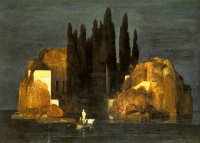Islomania
From The Art and Popular Culture Encyclopedia
|
"Ever since reading Captain Wallis's and Captain Cook's accounts of their discoveries in the Pacific, I've dreamed of nothing but tropical islands." --Mutiny on the Bounty (1932) by Charles Nordhoff and James Norman Hall "There is in the nature of every man, I firmly believe, a longing to see and know the strange places of the world. Life imprisons us all in its coil of circumstance, and the dreams of romance that color boyhood are forgotten, but they do not die. They stir at the sight of a white-sailed ship beating out to the wide sea; the smell of tarred rope on a blackened wharf, or the touch of the cool little breeze that rises when the stars come out will waken them again. Somewhere over the rim of the world lies romance, and every heart yearns to go and find it."--White Shadows in the South Seas (1919) by Frederick O'Brien Now, what kind of government do we want? Very little government would be good, I think. - Without too many laws. No passports. - And no prisons. What? - No taxes. This is getting to be a perfect government. And I will add... --Atoll K, 1:02:00 |

|
Related e |
|
Featured: |
Islomania is a craze for or a strong attraction to islands.
Probably one of the first literary islomaniacs was Herman Melville, who although now famed as the writer of Moby Dick was better known during his life for Typee, a semi-autobiographical story of his stay in the Marquesas Islands in French Polynesia. He followed this with Omoo which describes various other islands and is mainly set in Hawaii.
The fame of Typee placed the seed of islomania within other famous 19th century writer such as Robert Louis Stevenson, Louis Becke, Jack London, and Joseph Conrad.
“Awfully nice man here tonight… telling us all about the South Sea Islands till I was sick with desire to go there; beautiful places, green forever; perfect climate; perfect shapes of men and women, with red flowers in their hair; and nothing to do but study oratory and etiquette, sit in the sun and pick up the fruits as they fall.”
Robert Louis Stevenson Private letter of spring 1875
In the aftermath of World War I, the South Pacific again attracted a host of writing talent in search of a simpler world, they were inspired by the tales of Stevenson and London. Americans James Norman Hall, Charles Nordhoff, Robert Dean Frisbie, and Frederick O'Brien, and W. Somerset Maugham wrote numerous short stories and serials about Polynesia which captured the public imagination.
World War Two bought several other writers who became committed islomaniacs as well. James Michener being the most famous, whose books on the islands and the myth of Bali Hai created a powerful mythos of the beachcomber escapism to tropical islands.
The post war period saw a host of Islomaniac authors who, perhaps having experienced the horrors of war, saw islands as places to escape to.
One of the most committed islomaniacs was a New Zealander called Tom Neale who, inspired by the stories of Nordhoff and Hall and Robert Dean Frisbie, escaped to Suwarrow Atoll in the Cook Islands where he lived alone for 16 years.
The most famous proponent of islomania was the author Lawrence Durrell who fell in love with the islands of the Mediterranean and featured them in his numerous books.
The author Paul Bowles fell in love with the island of Taprobane, off the coast of Sri Lanka and wrote several novels there, as well as short stories describing his love for the island.
It wasn't just authors that were Islomaniacs, there are also those who fell in love with islands, bought them and lived on them.
Noted authors (chronological)
- Herman Melville: Typee (1846), Omoo (1847), etc.
- Charles Warren Stoddard: South-Sea Idyls (1873), Summer Cruising in the South Seas (1874), etc.
- Robert Louis Stevenson: In the South Seas (1896)
- Henry De Vere Stacpoole: The Blue Lagoon (1908)
- Jack London: Adventure (1911), South Sea Tales, etc.
- J. Allan Dunn: The Island of the Dead (1915), Beyond the Rim (1916), etc.
- W. Somerset Maugham: The Moon and Sixpence (1919), "Rain," etc.
- Frederick O'Brien: White Shadows in the South Seas (1919)
- Robert Dean Frisbie: The Book of Puka Puka (1929), etc.
- Charles Nordhoff and James Norman Hall: Mutiny on the Bounty (1932)
- James A. Michener: Tales of the South Pacific (1947)
See also
- Island
- Mania
- Desert island
- Private island
- South Seas genre
- List of islands in the Pacific Ocean
- Robinson Crusoe

